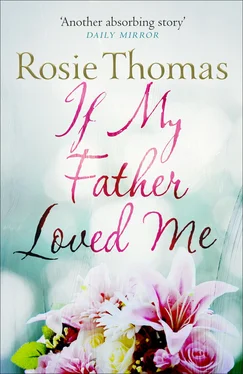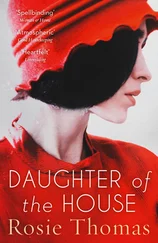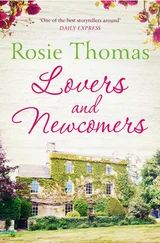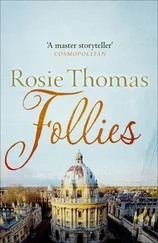1 ...6 7 8 10 11 12 ...25 I was talking too much, I realised. It would be tiring for him. ‘Do you remember?’
‘How old were you?’ he asked, restlessly moving his legs and frowning with the effort of recollection.
‘Six, or seven.’
‘Back in ’56, then.’
I was pleased that he knew the year of my birth. I wouldn’t have placed a bet on it. ‘Yes.’
‘We were working on contract for Coty.’ His hand moved a little in my grasp, as if he were trying to reach for something, and then fell back again. ‘I don’t remember the day. It must have been boring for you.’
We’re so polite to each other, I thought. We are like a rough sea swirling under a thin skin of ice.
While the old man and my father continued with their sniffing and scribbling I began to fidget and rock on my chair. I made a wigwam of dippers and then, with a hasty movement to stop it collapsing, I knocked over a bottle. The bottle rolled across the table and stopped in front of Ted.
He raised his head, his forehead corrugated with irritation and his eyes cold. It was a look I had seen often enough. ‘Why don’t you go out and sit by Miss Mathers?’
Miss Mathers was the woman with piled-up hair. I had seen them laughing together and heard Ted call her Babs, but I understood that she was Miss Mathers to me. I stood up obediently.
Miss Mathers gave me some pencils and some sheets of paper to draw on, then went back to her typing. She rolled letterheads and pale-pink and green flimsies sandwiched with carbon paper into her black-and-gold typewriter and busily stabbed the keys. Once or twice she answered the telephone in a sing-song voice: ‘Phebus Fray grances.’
At twelve thirty Ted and I went out. After the dimness inside the warehouse the sunshine was so bright it made me blink. We strolled down Kingsland Road to a pub and I sat on a bench in the sun whileTed went inside. My excitement flooded back with the novelty of all this and I swung my legs so my white socks flashed. Ted brought out lemonade and a cheese sandwich for me, and a pint of beer and a ham-and-pickle sandwich for him. He took a long swallow of the beer and rubbed the froth from his clipped moustache. Then he slid a packet of Players from his pocket and lit one. He blew out the smoke in a long plume and sighed with pleasure. ‘Not a word to a soul,’ he said to me, pressing his lips with the side of his index finger. ‘No good for the old nose , booze and fags, are they?’
I was awed to be part of this conspiracy. The old man and Miss Mathers would have had to torture me before I would have breathed a word about my father’s lunchtime habits.
The afternoon of that day was the same, except that the hours seemed longer than the morning’s. My father and the old man were shut up in the lab together and Miss Mathers largely ignored me. I drew some desultory pictures on my sheets of paper and looked at shiny brochures with pictures of women and tins of talcum powder in them. Yet as Ted and I finally rode home in the bus, along Holloway Road and up to the Archway, I felt utterly triumphant. The new words I had learned still rang in my head: mimosa, musk, amber. Mr Phebus had given me a folded ten-shilling note when Ted took me into his office to say goodbye. But the best of it was the new footing I felt that I was on with Ted himself.
Before now, he had gone out in the mornings and come back again at night with the newspaper, a kiss for my mother and a joke for me. He brought different sounds and smells and a new atmosphere into the house with him, but I had no picture in my mind of where he had been. Quite often he was away at night too, or for days at a stretch, on business for Mr Phebus.
But after today, I felt that I was a part of his other world. There had been beer on his breath as we walked back to the warehouse after the pub, and he had put pennies into a chewing gum machine on a wall. We were both chewing one of the little white pillows as we walked diagonally across the bomb-site to the warehouse door. I had heard him joking with Miss Mathers, although I didn’t like the soft teasing sound that crept into his voice when he spoke to her. At Miss Mathers’s suggestion, I had carried their pot of tea into the lab at four o’clock. Ted and Mr Phebus were both in their shirtsleeves with scratched notes and discarded dippers spread everywhere, and I understood that they were too preoccupied to glance at me. I accepted my lack of importance with proper humility.
The impression of that day stayed with me for years. It defined my notion of work, as the utterly exotic somehow hemmed in by the tedious progress of hours. At the end of it, as Ted and I marched up the garden path to the house where my mother was waiting for us, I kept my thrilling new awareness locked inside me.
My father was an artist of the first degree. He was a nose.
The house that night seemed colourless and smaller and overfamiliar and my mother even quieter than usual. ‘What did you do?’ she asked, as she brushed my hair. The sheets on my bed were smoothed down and I knew without looking that my hot-water bottle with the rabbit cover was in its proper place.
‘Drew some pictures,’ I answered evasively. I didn’t want to share the experience, even with her.
‘That’s nice.’
I didn’t ask about her day’s absence. Maybe she had been to see the doctor about her headaches. Sometimes they made her eyes red and swollen so she had to lie down on the double bed, a small shape hunched up on the green candlewick cover with her back turned to the door.
‘It wasn’t boring,’ I told Ted now. ‘I loved it.’
‘He was a good perfumer, the old man, a craftsman. I learned everything I needed to know from him. No business sense, though. None at all.’
I had to lean closer to catch his words. His voice seemed to be fading to an echo of itself and his eyes were gradually falling shut. I thought he might be drifting into sleep and I had to stop myself from grasping his hand and shaking it hard to keep him with me. I watched the shallow rise and fall of his chest under his pyjama jacket.
Then his eyes snapped open again and he struggled to sit upright. ‘It stinks in here,’ he complained. His nostrils flared and deep lines pulled the corners of his mouth downwards. I sniffed the air and caught a whiff of vomit and a faint fecal undertone. If even I could smell it, the ward must indeed stink to Ted’s sensitive nose.
I sandwiched his hand between my two. ‘We need something stronger to block it out. I’ve got an idea. Shall I go out and buy some perfume to spray round?’ I could hear the cheeriness in my voice cracking and shivering like the sea ice, with grief welling up from beneath. ‘What would you like? Joy? Vent Vert? Or one of your own? How about Black Opal or Iridescent?’
‘I’ve smelled enough perfume for one lifetime,’ Ted said irritably.
I bent my head and waited. And then, when I finally stole a glance at his face, I saw that this time he really had fallen asleep.
I went down to the hospital visitors’ car park, where I could use my mobile phone, and called Lola to relay the news.
‘Oh God, Mum, I’m sorry. Poor Grandad. I’d better ring in and cancel my shift,’ she said at once. Lola worked in a bar during university holidays. At least she’s at home, I told myself, not up in Manchester as she was all term-time. We agreed that she would collect Jack from school in her car and they would come straight up to the hospital.
‘Drive carefully,’ I warned her. ‘Of course I will.’
Next I telephoned Penny at the Works, as we call the book bindery and small print shop we jointly own. Penny and I have been business partners for twelve years. I have always loved the physical weight and dimensions of fine books, the texture of paper, and the variety and intricate grace of typefaces, and Penny possesses the rare combination of design flair and business acuity. We work well together and although there are no great riches in what we do, we make an adequate living out of our leather bindings and hand-set printing.
Читать дальше












